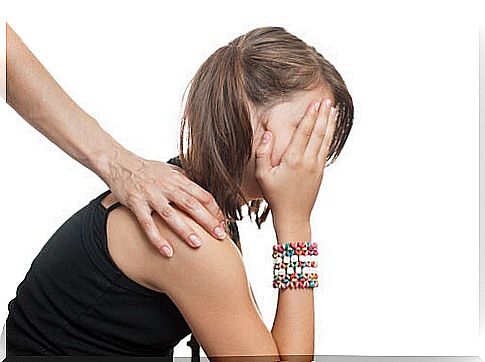Self-criticism And Shame In Adolescents

Recognizing your own mistakes and failures is not a common habit. In most cases, people focus on showing off their achievements and virtues and not on recognizing their areas for improvement. However, we always evaluate everything. Therefore, self-criticism is not an isolated event.
In general, it is difficult to find the balance between right and wrong. Especially when it comes to making judgments about ourselves. In adolescence, this can be even more difficult.
As the popular saying goes “The eye does not look inward.” This means that it becomes easier for us to criticize other things than to evaluate ourselves and recognize what and why we should improve this or that.

How does it affect the formation of the adolescent?
The identity is in full formation, so the ups and downs are normal and necessary. To do this, it is necessary to initiate them into self-criticism. Even though it may be embarrassing at first.
Healthy self-criticism will allow them to evaluate themselves and grow as healthy and strong people. Of course, this cannot be mastered overnight, so they will need some guidance and support until they learn to balance their judgments and opinions, especially towards themselves.
Excessive self-criticism can lead to perfectionism and also lead to low self-esteem. Teenagers who are excessively critical of themselves may come to think that they are not as good as others, that they will fail at everything, and so on.
A few words for parents
Many adolescents do not dare to speak in front of other young people or adults. They are not involved in the activities of others their own age and even talking on the phone could be a great challenge for them, or even ask someone for an address on the street.
When they cannot find a way to blend in, they may become very reserved and isolated in their room because they feel they should not expose themselves, and they are afraid or ashamed that others will see or discover you doing some activity. Inevitably, they pay close attention to what they will say.
Another situation is that this feeling of shame and excess of self-criticism can lead them to fail in their studies. You may be a brilliant teenager, but being so meticulous in your studies and schoolwork, you can create an imbalance that can overwhelm you.
How can parents help?
One of the first things parents can do so that excessive self-criticism and shame do not sink their child is:
- Recognize the situation. Don’t approach the issue with the justification that “you’ll get over it.” Strive so that this situation your child is facing does not become a wall or obstacle in your family or school relationship.
- Avoid being overprotective as this can hinder your social development.
- Learn to listen to your child. Let him share your feelings and don’t downplay it. What may be trivial for adults can be a big problem for them.
- Be positive. Commend him for things he has done well. Maintain a relaxed atmosphere in your family so that day-to-day stresses are not an additional burden.
- Invest in quality time and do family activities. Don’t forget that your child is in the process of creating his or her own identity. At some point, your child will need to evaluate himself or be self-critical. As parents, we are responsible for giving them the necessary guidance in a balanced way.
How to face self-criticism if you are a teenager?
As adolescence is a fundamental stage in your personal development, it is important that you pay attention to these tips:

1. Learn to listen
If you pause and meditate on the topic of conversation or the question posed, you can answer in a simple way and even if you do not know anything about it, you can ask “What are they referring to?”, That does not have to make you feel less.
After all, who does not ask, does not solve his doubt. And although you can consult it alone, on the Internet, the healthiest thing is for you to ask and interact with others.
2. Recognize the problem
The problem exists and ignoring it will not make it disappear, therefore, the healthiest thing is to recognize it and find the solution. Talk to someone you trust and express your ideas, that person could help you find the tools you need to feel better and overcome the situation.
3. Avoid isolating yourself and defend your opinion
If you don’t agree with something, express it calmly. You do not have to shut it up and you do not have to run over others, even if they are wrong. On the other hand, you don’t have to access everything just to try to please.
Try to be balanced. Do not praise others, nor do you belittle them. Everyone has their light side and their dark areas. Even you. In short, we are all a grayscale, so you don’t have to go to extremes.
As you approach adulthood, you will have more courage to deal with other situations. And if you manage to balance your training during adolescence, self-criticism will not be a major problem.
Over time, you will build a strong identity that helps you feel comfortable, secure, and confident. Consequently, you will be able to establish healthy bonds and have quality personal relationships.










